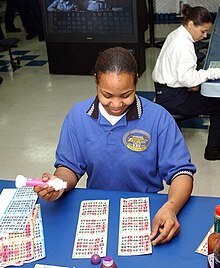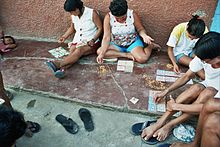bingo
Bingo is a lottery game that is particularly popular in the United Kingdom , the Philippines, and the United States . Bingo is a derivative of the parlor game lottery .
origin
The game name Bingo was introduced in 1929 by the American Edwin Lowe. At a fair in Georgia he had seen a group of Spanish gamblers covering the drawn numbers with dried beans and shouting “Beano” when they won. When Edwin Lowe hosted his first round of Beano in New York, a winner shouted "bingo" in the heat of the moment. Lowe liked that name, and so it stayed that way. For a dollar a year, others were allowed to use the game themselves, but on the condition that it was called bingo.

Game flow
The participants buy tickets or participation coupons that are printed with a number of numbers. As in the lottery, a conférencier randomly draws balls with printed numbers from a drum. He calls out these numbers, whereupon the participants mark them on their playing cards with a color stamp or a stone - provided they have the called out numbers on their participation coupon. As soon as the first participant has been able to mark all 5 numbers in a horizontal or vertical row or diagonal on his ticket, he calls out loud and audible “Bingo!”. Sometimes it is also considered a winning combination when the middle and the four corners are checked. In other game variants, different figures are also a win; there is also the variant that all numbers have to be ticked off in order to win ("blackout variant"). After checking his ticket, he is the winner, receives a cash or cash prize and the game round is over.
Unlike other lotteries, bingo has a community effect as the participants sit in a hall. Ecclesiastical parishes sometimes use this type of game to keep parish members busy as well as to fund charitable projects with the proceeds of the bingo lottery.
distribution
Bingo is also the basis for successful programs on television. Bingolotto has been around in Scandinavia since the 1990s. In Germany ( bingo on Sat.1 and Bingo! On NDR) and Austria ( bingo on ORF) various bingo programs have been running.
In the case of sausage loaf or egg loaf in parts of the Bergisches Land , sausages are raffled off during the kale season and eggs in accordance with the bingo rules in the time before Easter.
In Turkey , bingo (Turkish: tombala ) is traditionally played on New Year's Eve with the whole family.
In the German press landscape, bingo is used to increase the "sold circulation " according to IVW . The playing cards with several game rounds are added to the newspaper in advance and also given away at the kiosk. The winning numbers are drawn by a notary . The winning numbers will be published daily on the front page of the newspaper until a winner reports to the newspaper and registers his or her claim to the prize. In the case of legitimate winners, a new game round then starts. The best- known games are “Gold-Bingo” or “Rubbel Dich rich!” From Bild , BZ-BINGO from BZ and Rubbelmax from Berliner Kurier . The legal framework for the implementation of such games is very narrow and the subject of legal disputes time and again.
A variant common in Mexico that is played with pictures instead of numbers is Lotería .
Bingo halls
Between 2006 and 2012, the number of bingo halls organized in the Bingo Association fell from 670 to 400 in the UK.
Special forms
Web links
Individual evidence
- ↑ Björn Finke: Everything bingo? In: Süddeutsche Zeitung via Onleihe , October 5, 2013 ( PDF ).


